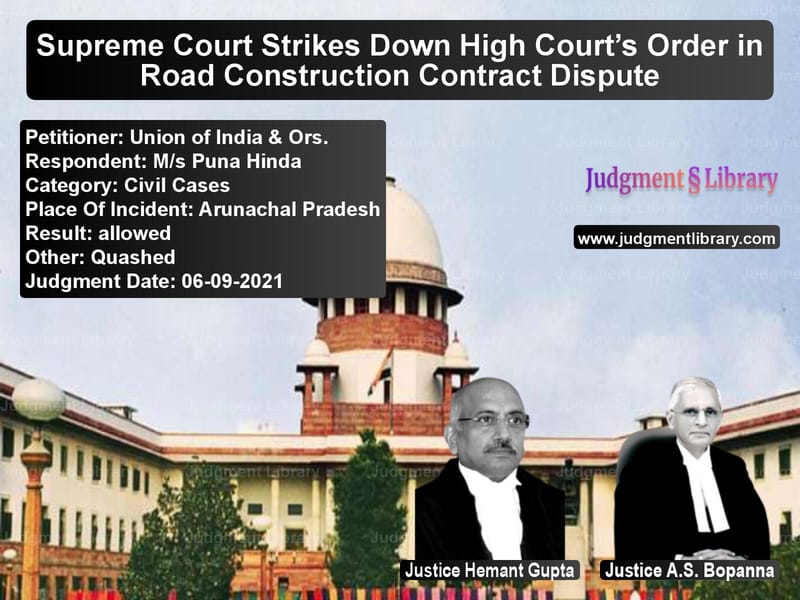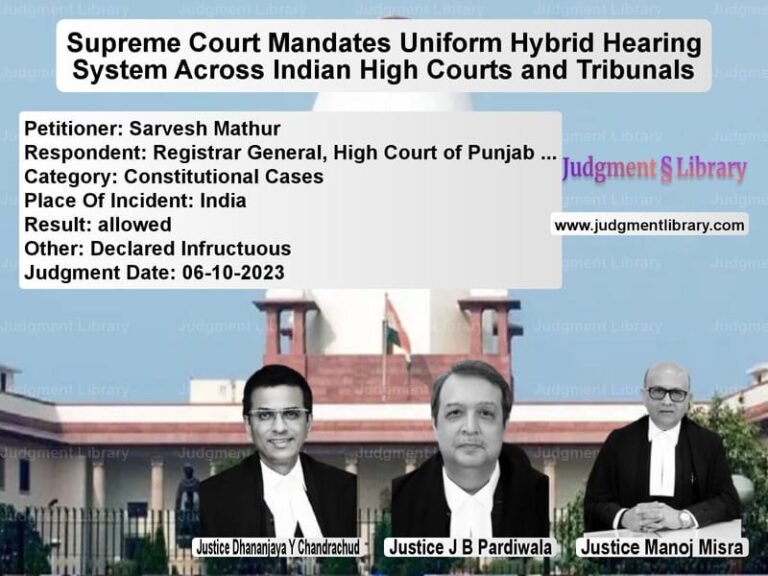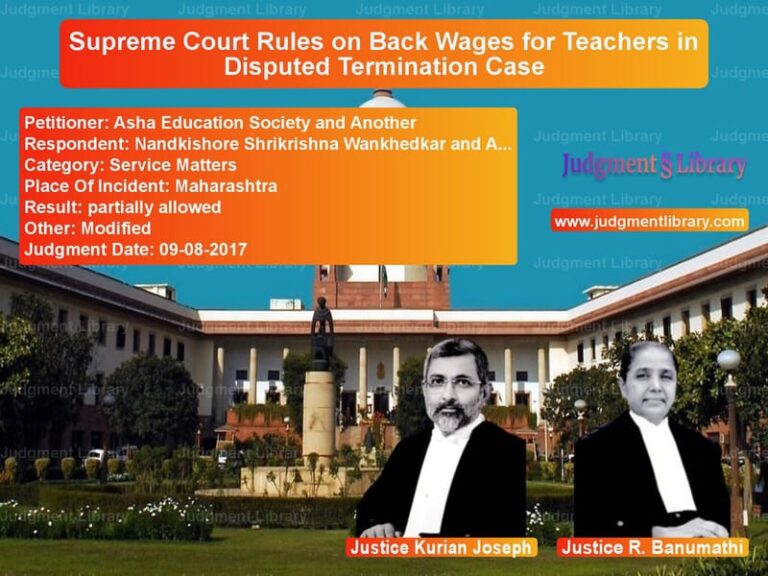Supreme Court Strikes Down High Court’s Order in Road Construction Contract Dispute
The Supreme Court of India, in the case of Union of India & Ors. vs. M/s Puna Hinda, adjudicated a contract dispute concerning road construction between Lumla and Tashigong under the Special Accelerated Rural Development Programme (SARDP). The dispute centered around a claim by the contractor for additional payments based on a Joint Survey Report that was later disputed by the authorities. The Supreme Court overturned the Gauhati High Court’s ruling, emphasizing that such contractual disputes should be resolved through arbitration rather than writ petitions.
Background of the Case
The dispute arose from a road construction project under the Border Roads Organisation (BRO). Key facts include:
- A Notice Inviting Tender (NIT) was issued on October 22, 2008, for constructing a road from Km 26.800 to Km 47.850.
- M/s Puna Hinda’s bid was accepted at Rs. 31,87,58,950, and a work order was issued on July 15, 2009.
- The contract was later amended, increasing the work cost to Rs. 35,03,15,695.23.
- The work involved formation, permanent, and surfacing work, each measured based on contract conditions.
Dispute Over Payment
The contractor completed the formation work by September 20, 2012, and a Joint Survey was conducted on January 23, 2013. However, the Competent Authority later rejected the survey findings, leading to a dispute over payments:
- The contractor claimed Rs. 31,57,16,134 for additional work.
- The authorities contended that the Joint Survey Report was flawed and did not accurately reflect the work completed.
- A revised Detailed Project Report (DPR) was proposed but not accepted due to time lapse and weather effects.
High Court’s Ruling
The contractor filed a writ petition in the Gauhati High Court, which ruled:
- The Competent Authority’s refusal to approve the Joint Survey Report was arbitrary.
- Re-survey was not feasible after five monsoons.
- The payment should be made based on the Joint Survey Report.
Aggrieved by this order, the Union of India appealed to the Supreme Court.
Supreme Court’s Key Observations
1. Contractual Disputes Must Be Resolved Through Arbitration
The Supreme Court reiterated that contractual disputes should be settled through arbitration as per the agreement. It held:
“When a contract provides for arbitration, the parties must exhaust that remedy before seeking intervention through a writ petition.”
2. High Court’s Overreach in Directing Payment
The Court criticized the High Court for directing payment without verifying the authenticity of the Joint Survey Report:
“The High Court erred in assuming the correctness of the Joint Survey Report without considering the objections raised by the authorities.”
3. The Joint Survey Report Lacked Official Approval
The Court noted that the Competent Authority had rejected the survey report due to procedural flaws:
“A disputed survey report cannot be the sole basis for determining financial liability, especially when official approval was never granted.”
4. Measurement Books Should Have Been Used
The Supreme Court observed that the contractor’s claims should have been assessed based on contemporaneous measurement books rather than a retrospective survey:
“The measurement books maintained during the execution of work provide a more reliable basis for determining the quantum of work done.”
Final Judgment
The Supreme Court set aside the High Court’s ruling and dismissed the contractor’s writ petition. Key rulings include:
- The contractor must pursue arbitration for any payment disputes.
- The Joint Survey Report alone cannot be used to justify additional claims.
- The High Court’s order directing payment was legally unsustainable.
Implications of the Judgment
1. Reaffirming Arbitration as the Preferred Dispute Resolution Mechanism
The ruling underscores the importance of arbitration in contractual disputes, preventing premature judicial intervention.
2. Restricting Judicial Overreach in Contractual Matters
The Supreme Court reinforced that courts should not bypass contractual dispute resolution mechanisms unless fundamental rights are violated.
3. Ensuring Proper Assessment of Construction Work
The judgment clarifies that payments should be based on authenticated records and contemporaneous measurements, not retrospective surveys.
4. Preventing Financial Mismanagement in Government Contracts
The ruling discourages exaggerated claims based on disputed survey reports, ensuring accountability in public sector projects.
Conclusion
The Supreme Court’s decision in Union of India & Ors. vs. M/s Puna Hinda reinforces the principle that contractual disputes should be resolved through arbitration and not through writ petitions. By setting aside the High Court’s order, the Court ensured that contract payments are determined through legally valid procedures rather than judicial directives based on disputed surveys.
Petitioner Name: Union of India & Ors..Respondent Name: M/s Puna Hinda.Judgment By: Justice Hemant Gupta, Justice A.S. Bopanna.Place Of Incident: Arunachal Pradesh.Judgment Date: 06-09-2021.
Don’t miss out on the full details! Download the complete judgment in PDF format below and gain valuable insights instantly!
Download Judgment: union-of-india-&-ors-vs-ms-puna-hinda-supreme-court-of-india-judgment-dated-06-09-2021.pdf
Directly Download Judgment: Directly download this Judgment
See all petitions in Contract Disputes
See all petitions in Damages and Compensation
See all petitions in Specific Performance
See all petitions in Public Sector Employees
See all petitions in Judgment by Hemant Gupta
See all petitions in Judgment by A. S. Bopanna
See all petitions in allowed
See all petitions in Quashed
See all petitions in supreme court of India judgments September 2021
See all petitions in 2021 judgments
See all posts in Civil Cases Category
See all allowed petitions in Civil Cases Category
See all Dismissed petitions in Civil Cases Category
See all partially allowed petitions in Civil Cases Category







